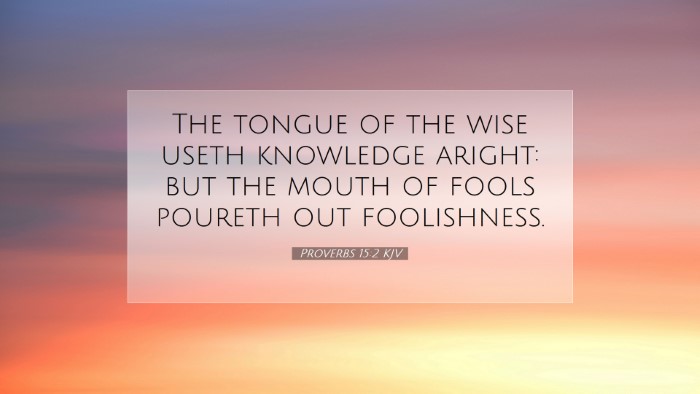Commentary on Proverbs 15:2
Proverbs 15:2 states:
"The tongue of the wise uses knowledge aright: but the mouth of fools poureth out foolishness."
Introduction
This verse encapsulates a fundamental truth about the power of speech and the distinctions between wisdom and folly. It emphasizes the importance of the tongue as an instrument of knowledge and understanding. In examining this verse, we will draw insights from various public domain commentaries, elucidating its theological and practical implications for believers.
Exegesis of Proverbs 15:2
To fully appreciate this proverb, we consider two key components: the tongue of the wise and the mouth of fools. The former reflects a thoughtful application of knowledge, while the latter represents an indiscriminate outpouring of ignorance.
The Tongue of the Wise
Matthew Henry notes that the wise person "uses knowledge aright," suggesting that wisdom involves discernment in how one communicates. This indicates that wisdom is not merely an accumulation of knowledge but also the application of that knowledge in a way that is instructive and beneficial to others.
Albert Barnes elaborates further, stating that true wisdom involves the ability to express knowledge in a manner that edifies the hearer. The wise tailor their words to suit the needs, contexts, and understanding of their audience, thus creating a more profound impact.
Adam Clarke adds that the wise tongue "uses knowledge in a proper manner," which suggests an ethical dimension to communication. The wise are not only informed but also ethical, ensuring that their words are aligned with truth and righteousness.
The Mouth of Fools
In stark contrast, the "mouth of fools poureth out foolishness." Here, Matthew Henry describes the "fool" as someone who speaks without thought or discretion. This lack of wisdom leads to conversations that are pointless, harmful, or misleading. The fool does not value the weight of their words, resulting in an outpouring of thoughts that may lack coherence or truth.
Albert Barnes remarks that the fool's speech is often characterized by arrogance and a disregard for sound judgment, making them unfit to guide others. Their words reflect their folly and perpetuate ignorance rather than enlightening those around them.
Adam Clarke points out that the fool's communication style may be humorous or entertaining, but it ultimately lacks substance. The foolish tongue may gain temporary attention but does not lead to lasting wisdom or understanding.
Theological Implications
This verse speaks volumes about the nature of wisdom in biblical theology. Wisdom is depicted as both a divine attribute and an essential quality for human conduct. The contrast between the wise and the foolish is not merely an intellectual difference but reflects a deeper spiritual reality.
Divine Wisdom
According to Matthew Henry, divine wisdom is a gift from God that imparts understanding to those who seek it (James 1:5). This verse calls believers to pursue wisdom actively, as it will influence their speech and interactions with the world.
Ethics of Communication
The ethical implications of this verse compel the believer to reflect on their speech. Albert Barnes suggests that believers must strive to ensure their communication aligns with the principles of love, truth, and grace, which are hallmarks of a wise heart. This aligns with the New Testament's admonition in Ephesians 4:29 to let no corrupt communication proceed from our mouths.
Impact on Community
The communal impact of wise speech is profound. Adam Clarke emphasizes that the words of the wise can build up communities, fostering an environment of growth and learning. Conversely, the fool's words can tear down relationships, breed conflict, and lead to division. Therefore, this proverb is a reminder of the responsibility inherent in our communication.
Practical Applications
Proverbs 15:2 provides practical wisdom for a variety of settings, from personal relationships to church communities. Here are some applications gleaned from the commentaries:
- Seek Wisdom: Regularly pursue knowledge through Scripture, prayer, and sound teaching to ensure one's words stem from a wise heart.
- Be Thoughtful in Speech: Cultivate a habit of thoughtful communication, considering how words can either build up or tear down.
- Practice Active Listening: Before speaking, engage in active listening to gain insight into others' perspectives and needs.
- Encourage Others: Use words to foster encouragement, reflect grace, and provide constructive feedback in a loving manner.
- Avoid Quarreling: Recognize that foolishness often leads to strife; strive for peacemaking in conversations.
Conclusion
In summary, Proverbs 15:2 serves as a profound reminder of the importance of speech in shaping our relationships, communities, and personal conduct. By applying the wisdom found in this verse, believers are called to become wise stewards of their words, exhibiting knowledge and truth in all forms of communication.


